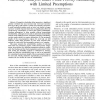Free Online Productivity Tools
i2Speak
i2Symbol
i2OCR
iTex2Img
iWeb2Print
iWeb2Shot
i2Type
iPdf2Split
iPdf2Merge
i2Bopomofo
i2Arabic
i2Style
i2Image
i2PDF
iLatex2Rtf
Sci2ools
118
click to vote
RTS
2011
2011
Feasibility analysis under fixed priority scheduling with limited preemptions
—Preemptive scheduling often generates a significant runtime overhead that may increase task worst-case execution times up to 40%, with respect to a fully non preemptive execution. In small embedded systems, such an extra cost results in longer and more variable response times that can significantly affect the overall energy consumption, as well as the system predictability. Limiting preemptions is often possible without jeopardizing schedulability. Although several authors addressed schedulability analysis under different forms of limited preemptive scheduling, current results exhibit two major deficiencies: (i) The maximum lengths of the non-preemptive regions for each task are still unknown under fixed priorities; (i) The exact response time analysis for tasks with fixed preemption points is too complex. This paper presents the schedulability analysis of real-time tasks with non preemptive regions, under fixed priority assignments. In particular, two different preemption mod...
| Added | 14 May 2011 |
| Updated | 14 May 2011 |
| Type | Journal |
| Year | 2011 |
| Where | RTS |
| Authors | Gang Yao, Giorgio C. Buttazzo, Marko Bertogna |
Comments (0)

